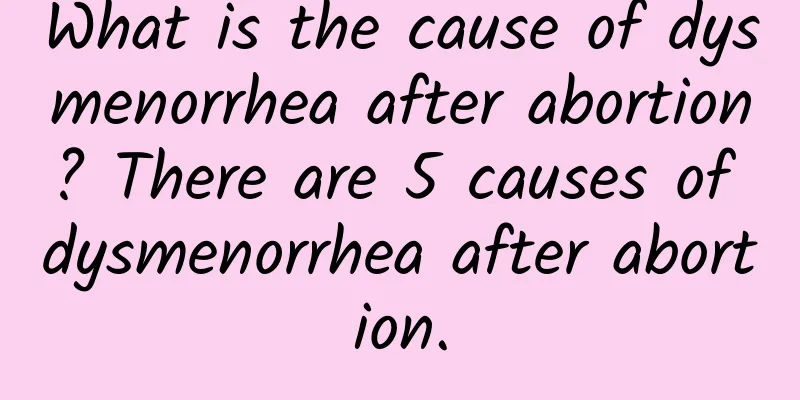What is the cause of dysmenorrhea after abortion? There are 5 causes of dysmenorrhea after abortion.

|
Many female friends have experienced miscarriage. Some have had artificial abortions because of unexpected pregnancies, while others have miscarriages due to embryo problems. Some female friends experience dysmenorrhea after miscarriage. For female friends who have this situation, they must want to know the cause of dysmenorrhea. So, what are the causes of dysmenorrhea after miscarriage? Causes of dysmenorrhea after miscarriage 1. Changes in uterine position Many female friends originally had an anterior uterus, but after a miscarriage, due to surgery, the uterus becomes retroverted or even retroflexed, which makes it easy to experience dysmenorrhea. Therefore, one of the common causes of dysmenorrhea after miscarriage is the change in the position of the uterus. 2. Inflammatory infection After a miscarriage, a uterine curettage operation may be required. If the relevant instruments are not strictly disinfected during the operation, it is likely to cause iatrogenic infection, resulting in dysmenorrhea after miscarriage. 3. Gynecological inflammation Some female friends do not pay attention to personal hygiene after abortion, which leads to gynecological inflammation, which can easily lead to dysmenorrhea. In addition, if you start having sex again soon after abortion, it is also easy to cause gynecological inflammation and dysmenorrhea. 4. Cold Women who have had an abortion need to take good care of themselves, and it is best to have a short confinement period, which can help the uterus recover as soon as possible. If you do not pay attention to rest, keep warm, or even come into contact with cold water right after the abortion, it is likely to cause the uterus to catch cold, resulting in dysmenorrhea. 5. Endocrine disorders If it is a normal pregnancy but you want to terminate it through abortion, it is likely to cause endocrine disorders, which can easily cause dysmenorrhea. What are the causes of dysmenorrhea after miscarriage? The above introduces the five major causes of dysmenorrhea after miscarriage, namely, changes in the position of the uterus, inflammatory infection, gynecological inflammation, cold and endocrine disorders. These five major causes are the main causes of dysmenorrhea after miscarriage. Female friends who encounter such situations should go to the hospital for relevant examinations and symptomatic treatment in time. |
<<: What is the best method for abortion at the age of 45? What are the common methods of abortion?
Recommend
What are the symptoms of posterior uterine wall adenomyosis? Is posterior uterine wall adenomyosis serious?
What are the symptoms of posterior uterine wall a...
What are the dangers of cervical hypertrophy?
If you have cervical hypertrophy, you should pay ...
How to diagnose acute pelvic inflammatory disease or chronic pelvic inflammatory disease
How to diagnose acute pelvic inflammatory disease...
What is premature ovarian failure? Four manifestations can help you judge
If there is a problem with premature ovarian fail...
What are the Chinese patent medicines for cervical warts
Using Chinese herbal medicine to treat small cond...
How long can you live with advanced chocolate cysts?
How long can a late-stage chocolate cyst last? Th...
What causes vaginitis?
According to gynecologists, one of the causes of ...
Is there a way to prevent ovarian cyst rupture?
What causes ovarian cyst rupture? Is there a way ...
5 types of drinks that women with dysmenorrhea should avoid during menstruation
Many women have to endure the great pain of dysme...
What are the diagnostic methods for female cervical warts?
Completely curing the disease is the wish of many...
Why do modern people suffer from uterine fibroids? Why do modern women have so many uterine fibroids?
Why do modern people suffer from uterine fibroids...
Nourish the liver, detoxify, help lose weight... Asparagus and coriander, these 4 foods are amazing!
Many people eat and drink excessively and sit for...
How to avoid Bartholinitis?
Bartholinitis is a common gynecological disease, ...
The golden period for fat loss after the Chinese New Year: 3 moves to eliminate fat around the waist
During the 9-day Spring Festival holiday, not onl...
What causes cervical erosion?
Cervical erosion in young people is a physiologic...









